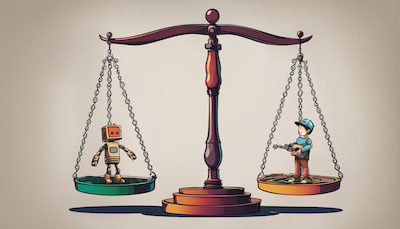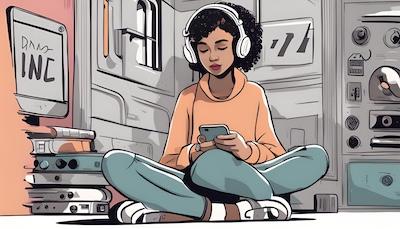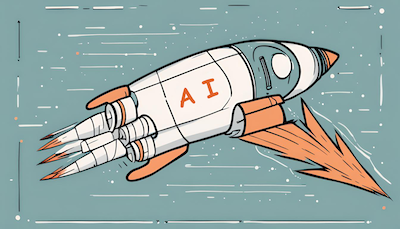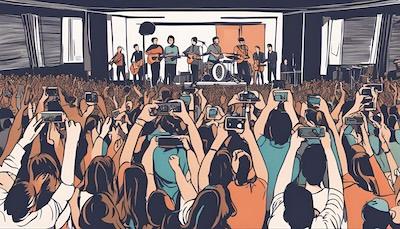
With One Voice - May 2024
Available in English, French, Spanish, and Portuguese
Artificial intelligence continues to raise key questions across the music sector. This month With One Voice welcomes guest columnist SADAIC CEO Guillermo Ocampo, who shares his perspective on AI and moral rights. We also examine how Gen Z is changing up music consumption, the impact of AI in the coming decade, and calls to increase fees paid to artists for live music in this post-pandemic environment.
Latest CIAM News:
The African Music Academy announces the regional winners of its awards
CIAM to gather in Seoul for special ExCo and CISAC General Assembly
ALCAM announces new management to support authors and composers across Latin America
CISAC Annual Report highlights its work programme on behalf of CMOs worldwide
Music creators to descend upon Montreal for 2024 CIAM General Assembly this October
Sign up to receive the With One Voice newsletter here.

Artificial intelligence and moral rights
Artificial intelligence is, without a doubt, one of the great achievements of humanity in our days.
Needless to say that this new technology offers a lot of possibilities for development in topics related to health, education and many others.
However, when we think about Artificial Intelligence and its relationship with the activity of creators, the situation is not that optimistic.
With the Generative Artificial Intelligence the new technologies collide with authors’ rights.
Moral rights is the first big issue to solve. The use of original works, as it is conceived up to now, implies the use of the work as it was created. This means the respect of two fundamental pillars: the integrity of the work and the respect of paternity. If we analyze the field of the licenses granted to digital platforms, we will see that they cover the use of the original work, as it was conceived by its creator.
In the world of Artificial Intelligence, all those parameters have to be reconsidered.
The use of AI implies that the original work will be modified, using training processes, and will produce a derived work that will have many or few elements of contact with the original work or works but will never be the same work.
It seems clear that the AI process affects moral rights as we know them. And a solution to this is not foreseeable in the near future.
With the present framework, - the classic model - the authorization for altering a work is usually done before the use. This would not be possible in the AI world. The dynamics involved in the use of the works make it impossible a previous authorization and can turn moral rights into dead words.
The question that is yet to be answered is if this new technology is compatible with the classic model for the protection of authors’ rights or, as is my opinion, there is a new paradigm that will force us to reconsider the old principles we know.
Guest columnist: SADAIC CEO Guillermo Ocampo

How Gen Z is Shaping the Soundtrack of Tomorrow
In the ever-evolving landscape of the music industry, one generation stands out for its remarkable influence and innovation: Generation Z. Born between the mid-1990s and early 2010s, Gen Z is changing the way music is consumed and redefining the essence of musical expression.
From streaming trends to emerging artists, here's a closer look at how Gen Z is reshaping the music scene, backed by data.
Streaming Dominance:
Streaming platforms broadly define Gen Z's relationship with music. According to a Nielsen Music/MRC Data report, streaming accounted for 85% of total music consumption in the United States in 2023, with Gen Z leading the charge.
The Rise of Tik Tok:
Even in the middle of the controversy, experts like Scott Galloway (NYU Stern School of Business) say that TikTok could soon surpass platforms like Netflix or Spotify to become the biggest entertainment hub in the world.
One of the most significant factors influencing Gen Z's music consumption habits is the rise of TikTok. According to Sensor Tower, TikTok was the most downloaded app globally in 2023, with over 1.5 billion downloads.
The most powerful algorithm on the planet, which controls the "For You" page, exposes users to an endless stream of short-form videos featuring snippets of songs, often accompanied by viral dances or creative challenges. As a result, obscure tracks can quickly go viral, propelling previously unknown artists to stardom overnight.
Diversity and Authenticity:
Gen Z values diversity and authenticity in their music. A study by MIDiA Research found that 68% of Gen Z consumers say it's essential for artists to be authentic to themselves.
They usually follow and support artists who are unapologetically themselves and who use their platform to address social issues and advocate for change. This generation embraces artists from diverse backgrounds and genres, from Rap and Hip-Hop to Indie Pop, Latin, and Electronic or Dance music.
DIY Culture:
The democratization of music production tools has empowered Gen Z to create and share their music more efficiently than ever. According to a survey by TuneCore, 82% of Gen Z musicians said they use social media to promote their music, compared to 67% of millennials.
Platforms like SoundCloud and Bandcamp allow aspiring artists to upload their music directly to the internet, bypassing traditional gatekeepers like record labels. This DIY ethos has led to a proliferation of independent artists who can cultivate dedicated fan bases online without the support of major industry players.
As the first generation to grow up entirely in the digital age, Gen Z is revolutionizing the music industry in unprecedented ways, as evidenced by the data.
From their reliance on streaming platforms and social media to their embrace of diversity and DIY culture, Gen Z's impact on the music scene cannot be overstated. As they continue to shape the soundtrack of tomorrow, one thing is clear: the future of music is in their hands.

The AI Revolution - Its Impact on the Music Industry in the Next Decade
As we stand on the brink of a new era driven by artificial intelligence (AI), the music industry finds itself at the forefront of technological disruption.
In this article, we'll explore the anticipated impact of AI on the music industry, examining its potential pros and cons backed by data and projections.
Creative Innovation and Production Efficiency:
Pros:
AI-powered tools like neural networks and machine learning algorithms will accelerate the creative process, enabling artists to explore new musical horizons with unprecedented speed and efficiency.
According to a report by McKinsey, AI could increase music composition and production productivity by up to 25% by 2030.
Cons:
The AI-generated music lacks the emotional depth and authenticity of human-created compositions. This potential homogenization of musical styles could lead to a loss of the unique artistic diversity humans bring to music.
The Music Industry Journal conducted a survey that found 45% of respondents expressed reservations about the authenticity of AI-generated music.
Personalized Music Experiences and Audience Engagement:
Pros:
AI-driven recommendation engines and content curation algorithms are ready to revolutionize music discovery and consumption, delivering customized experiences tailored to individual preferences.
Spotify's use of AI for music recommendation has led to a 35% increase in user engagement and a 60% increase in premium subscriptions.
Cons:
AI algorithms could perpetuate echo chambers and filter bubbles, limiting exposure to diverse musical genres and perspectives.
A study by Cambridge University revealed that AI-driven recommendation algorithms tend to reinforce existing user preferences rather than promote serendipitous discovery.
Copyright Protection and Content Monetization:
Pros:
AI technologies offer innovative solutions for copyright enforcement, content identification, and royalty management, enabling artists and rights holders to protect their intellectual property and maximize revenue streams.
According to a study by the World Intellectual Property Organization (WIPO), using AI for copyright enforcement has led to a 40% reduction in unauthorized distribution and a 25% increase in revenue for rights holders.
Cons:
AI-generated content is still created by infringing existing copyrights and intellectual property rights, leading to legal disputes and erosion of creative ownership.
According to data from the Copyright Clearance Center, the rise of AI-generated content has resulted in a 20% increase in copyright infringement claims filed with digital rights organizations.
In conclusion, as AI permeates every facet of the music industry, its impact will be profound and far-reaching.
While the potential benefits are vast, from creative innovation to personalized experiences and enhanced monetization, there are legitimate concerns about authenticity, diversity, and ethical implications.
As we navigate this transformative journey, the whole industry must embrace AI responsibly, fostering innovation while safeguarding the principles of creativity, diversity, and integrity that define the essence of music and human creators.

Lifting all boats in live music post-pandemic
“The live sector was the first to collapse from COVID and has been the last to recover.” That sentence from the 2023 CISAC Global Collections Report set the tone on live collections, from concerts and festivals, throughout the world. The report honed in on concerns that consumer spending cuts and constraints on touring budgets would hamstring a recovery. Recently, the Guardian’s Daniel Dylan Wray rang alarm bells on the need to increase fees paid to artists, and encourage more state support for the sector, to save creators against the ever-rising tide of inflation in a post-COVID environment.
We have heard about festivals recovering and many are thriving, yet concerns remained for small and medium-sized venues. Wray draws attention to artists that are losing money on tours now, while festivals are one of the few bright spots to find profit. Featured Artists Coalition CEO David Martin goes so far to say that touring is now middle and upper class-if you’re working class, you can’t afford to make it. 2,000+ capacity venues are the new threshold to making a profit. Post-Covid, progression to bigger venues for bands are happening faster than ever, such as in the Netherlands. It points to it becoming harder to make a living out of touring smaller capacity venues.
Inflation on everything from renting vans, lodging, and food has diminished touring returns. Sadly, for many, fees paid to artists and the size of audiences have not increased to combat this. A core element to this lack of increase? Booking agents and venues presume artists make money from streaming. Labels assume artists make money from touring. It is a vicious circle of misperceptions in the music industry Spider-verse.
What can be done? In many territories, government support schemes exist for touring abroad or for supporting live performances domestically. For example, the BPI Music Export Growth Scheme in the UK or various support structures within the Centre national de la musique in France. In the Netherlands, Dutch Music Export and the Dutch Fund for Performing Arts has funding, even for classical and jazz, depending on the structure. Educate yourself about these programs in your territory, advocate, and help make our stages financially healthy again for all generations.
